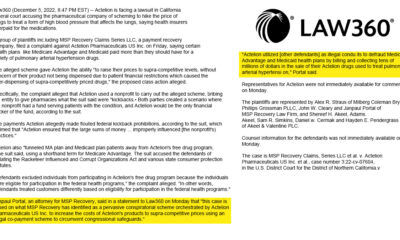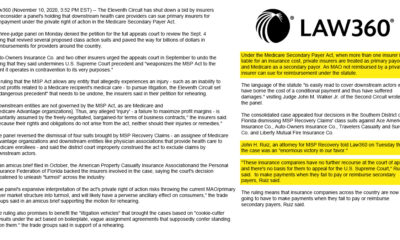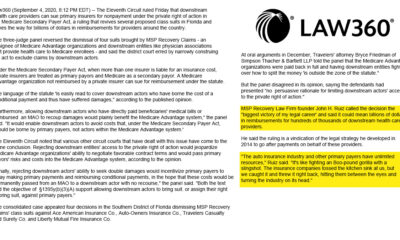Legal
Medicare Repayment Suits Aren’t Time-Barred, 11th Circ. Says
Published
4 years agoon
By
LifeWallet
By Hailey Konnath
Law360 (February 14, 2020, 9:39 PM EST) — The Eleventh Circuit has ruled that the Medicare Secondary Payer Act doesn’t require private entities or the government to have requested reimbursements for payments made on behalf of a beneficiary within a certain time period before filing suit under the act’s private cause of action, reversing a Florida federal court’s 2018 decision.
Thursday’s appellate decision marks a significant reversal in one of dozens of cases brought by MSP Recovery and its affiliated companies, which recover claims on behalf of Medicare Advantage organizations, independent physician associations and other entities that provide health care to Medicare enrollees.
In these cases, MSP Recovery and the affiliates challenged “the failure of no-fault automobile insurers to reimburse Medicare Advantage Organizations for medical bills that the primary payor had a responsibility to pay, pursuant the MSP Act,” MSP Recovery said in a statement.
In Thursday’s decision, the appellate court sided with MSPA Claims 1 LLC, the assignee of a Medicare Advantage organization, seeking reimbursement for payments the organization made for a beneficiary’s treatment following a car accident in early 2012.
MSPA Claims, which is affiliated with MSP Recovery, claimed that Kingsway Amigo Insurance Co., which covered the other driver involved in the accident, was the primary payor and should cover the costs. But MSPA Claims wasn’t assigned the recovery rights of the organization that initially made the payments until later, and it therefore didn’t learn of the accident or that Kingsway was the primary payor until late 2015, when it requested reimbursement and eventually sued, according to court filings.
In 2018, a Florida federal court granted Kingsway’s motion for summary judgment, finding that the so-called claims-filing provision in the Medicare Secondary Payer Act “plainly and unambiguously requires” a government request for reimbursement to happen within three years of the date on which the beneficiary received treatment. And MSPA Claims, as a Medicare Advantage Organization, stands “in the shoes of the government” and is also bound by that provision, the court ruled.
The Eleventh Circuit disagreed Thursday, holding that the claims-filing provision of the act is not a precondition to filing a private cause of action. The provision’s text and its relation to other provisions “indicate that it doesn’t operate as any sort of prerequisite — for anyone,” the three-judge panel said.
“Rather than imposing a strict requirement, the provision simply allows Medicare to overcome any time limits prescribed by an employer’s group health plan that might otherwise prevent it from requesting reimbursement,” it said.
Kingsway’s interpretation — that MSPA Claims needed to have requested reimbursement within three years — “creates significant intra-Act tension and perverse incentives” and “would lead to structural oddities within the Medicare Secondary Payer Act,” the Eleventh Circuit said.
MSP Recovery said in its statement that the decision effectively eliminates a primary defense being asserted by many of the defendants in its numerous similar cases “to ward off these recoveries.”
The case may have started as a car accident, but according to the Eleventh Circuit, “it has essentially nothing to do with the underlying accident or the resulting injuries.”
“Instead, it turns on a careful examination of the often-convoluted rules governing the federal Medicare program — and in particular the [Medicare Secondary Payer Act],” the panel said.
In the underlying dispute, a Medicare beneficiary was injured in a car accident caused by another driver in 2012, according to the suit. She received her benefits from a Medicare Advantage organization called Florida Healthcare Plus, and the other person involved in the accident was insured by Kingsway Amigo Insurance.
The beneficiary was treated for her injuries and Florida Healthcare, made nearly $22,000 in payments on her behalf. Kingsway eventually paid Florida Healthcare almost $6,700 to settle a personal-injury claim, per the suit.
Later, MSPA Claims was assigned Florida Healthcare’s recovery rights, and in November 2015, Kingsway informed MSPA Claims of the settlement and agreement. That was the first time it learned of Kingsway’s responsibility as a primary payor, the suit said. MSPA Claims then demanded reimbursement from Kingsway for the payments Florida Healthcare had made following the accident, it said. When Kingsway refused to pay up, MSPA took it to court.
According to MSPA Claims, Kingsway should’ve investigated whether the beneficiary received Medicare benefits — which would mean it could be a primary payor — but Kingsway failed to do so.
But Kingsway argued that MSPA Claims’ claim was too old because it hadn’t complied with the Medicare Secondary Payer Act’s claims-filing provision, which sets out a three-year period in which a request for reimbursement needed to be made. MSPA Claims’ request came a few months too late, it said. The Florida district court ultimately agreed.
Counsel for Kingsway declined to comment Friday, and counsel for MSP Recovery didn’t immediately return a request for comment.
U.S. Circuit Judges Adalberto Jordan and Kevin Newsom and U.S. District Judge Susan Webber Wright sat on the panel for the Eleventh Circuit.
MSPA Claims is represented by Francesco A. Zincone of Armas Bertran Pieri.
Kingsway Amigo was represented as recently as December by Angel Castillo Jr. and Pedro Luis DeMahy of DeMahy Labrador & Drake PA, and David S. Allen of Ruberry Stalmack & Garvey LLC.
The case is MSPA Claims 1 LLC v. Kingsway Amigo Insurance Co., case number 18-14980, in the U.S. Court of Appeals for the Eleventh Circuit.
–Editing by Breda Lund.
Legal


University of Florida’s Groundbreaking mRNA Vaccine Could Revolutionize Treatment for Brain Cancer Patients
In a landmark achievement in the battle against malignant brain tumors, a revolutionary mRNA cancer vaccine has ignited a robust...


NCAA Intends to Enhance Consumer Protection in Ever-Changing NIL Era
Charlie Baker, the president of the NCAA, has expressed the urgent need to establish a “consumer protection system” tailored for...
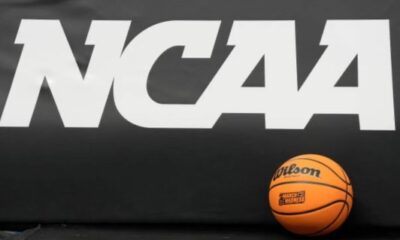

Redefining the Game: How One Attorney’s Fight Could Revolutionize College Athletes’ Rights
John “Jake” Krupski, a seasoned labor attorney from New Hampshire, was well-versed in representing the rights of various workers, including...
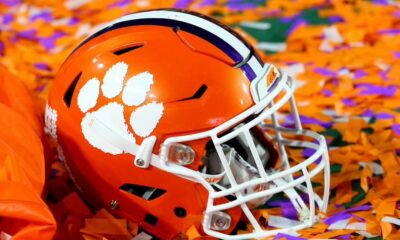

Clemson Files Lawsuit Over ACC Grant of Rights, Looking for Exit Out of Conference
In a bold move that reverberates across the collegiate sports landscape, Clemson University has taken the Atlantic Coast Conference (ACC)...


The Enhanced Games: A Controversial Pro-PEDs Take on the Olympics
In a daring departure from conventional sports norms, billionaire entrepreneur Peter Thiel, co-founder of PayPal and Palantir, is making waves...


Lawsuit Against Mars Inc. Claims Dark Chocolate Contains Toxic Metals
A proposed class action lawsuit has been filed in New York federal court claiming Mars Inc. failed to warn consumers...


